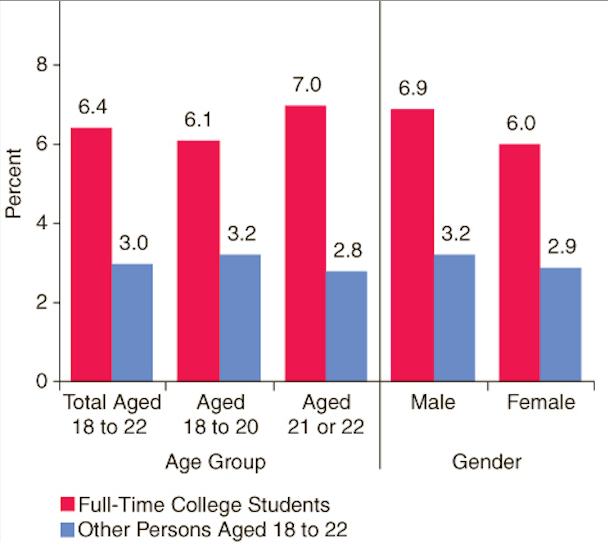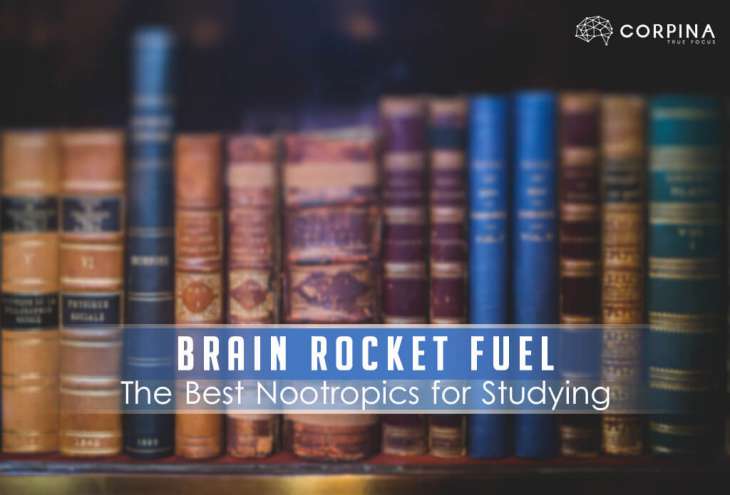Brain Rocket Fuel: The Best Nootropics for Studying
Some people seem to be naturally good when it comes to educational success – I’m not one of them. Don’t get me wrong, I’m not saying I’m a total idiot (I always got good grades).
It’s just that my brain doesn’t always behave as I’d like to – or to be more precise, I regularly struggle when it comes to mental focus. I yearn for more control over my grey matter, and this is what brain optimization is all about.
Brain Optimization without Becoming a Cyborg
If are a fan of Star Trek, you are going to remember the Borg. These guys were scary as hell, but they benefited from an optimized brain due to advanced technology. Futurists like Ray Kurzweil are predicting that over the next few decades, we are going to develop the technological know-how to improve our brains by sticking some super-fast computer processors in there – in the meantime, we have to make do with some more low-tech options.
The best of the current solutions for brain optimization would include lifestyle changes, concentration training, and nootropics (smart drugs). Later on in this article, we are going to be looking at each of these options.
Why You Need to Optimize Your Brain
I didn’t do very well at school. I left with no qualifications and had to return to education in my twenties. I managed to do okay, but it would have been so easy for me to just give up after failing as a teenager. Luckily, I realized the problem wasn’t the lack of a good brain but my inability to get the most out of it.
 It is only really recently that the idea of optimizing the brain has started to enter the mainstream. There have been people who talked about using diet to improve focus since at least ancient Greece – Pytagorus believed a vegetarian diet led to increased mental clarity – but the idea of preparing the brain for study has been mostly ignored up until recently.
It is only really recently that the idea of optimizing the brain has started to enter the mainstream. There have been people who talked about using diet to improve focus since at least ancient Greece – Pytagorus believed a vegetarian diet led to increased mental clarity – but the idea of preparing the brain for study has been mostly ignored up until recently.
Students are taught time-management and study skills but much of the focus is on external conditions (for example, studying in a quiet environment). Wouldn’t it be great if you could optimize your brain to improve your ability to learn and retain information?
This would not only make it easier for you to pass exams, but you may also save a great deal of time – after all, how much of your current learning time is wasted due to distraction? We have not yet reached the point where we can fully customize the brain to serve our purpose, but there are already many things we can do to improve mental focus, mental stamina, and memory.
Staying focused in class
These days when you hear of people taking something to help them study, usually college students, it’s almost always either Adderall, Ritalin, or caffeine pills.
More and more students are turning to amphetamines to stay focused in class, as revealed by a recent study from the Substance Abuse and Mental Health Services Administration.

The survey notes that most cases of Adderall abuse go unreported, and the actual percentage of students who regularly use some form of ADHD medication is closer to 15 or 20 percent – almost 1 in 5.
Nootropics > amphetamines
Thankfully however, there is a whole new range of study aids to choose from: nootropics. Nootropics allow us to optimize our brains in four main ways: better focus, increased mental energy, improved memory, and increased motivation.
With little to no risk of dependency, and no prescription required, nootropics are becoming more and more popular on health-conscious college campuses (in contrast, amphetamines can be incredibly addictive and habit-forming).
Whether you have a midterm to cram for, or simply just something you need to learn very quickly, it’s very likely that certain nootropics can help achieve the same focus and motivation results as Adderall and Ritalin.
Study nootropics that go the extra mile
There is no competition for first place: Modafinil (and its stronger brother, Armodafinil) wins by a long shot. Adrafinil – its prodrug – is converted to modafinil in the liver, yet the focus effect is less noticeable.
Modafinil’s effects are not so much a charge of energy or even stimulus, but rather a long-lasting plateau of alertness and easy focus. You will feel awake and alert for upwards of 10 hours after taking doses as low as 200 mg, even taken on a sleep-deprived exam-day. On other days, I might take 100 mg to last the entire day, and only 3 or 4 days a week.
The current paradigm is that liver function test results would be similar for bio-equivalent doses, as in, 200 mg modafinil versus 300 mg adrafinil.
Be realistic
Modafinil can be purchased online from international retailers, but it’s expensive and can take weeks before arriving in the mail — a problem if you have a test in the near future. The next best thing is a proper nootropics study stack.
Before we go into details about the “best” or “strongest” nootropic stack, it’s important to answer a few questions. Note: if you cannot address these questions honestly and accurately, then taking nootropics for studying will do more harm than good.
Hopefully, that got your attention.
Know thyself
The first question you must be able to answer is: what are your study goals and how do you think nootropics will help you realize those goals? If you’re someone who has difficultly getting motivated, then you’ll want nootropics that energize and motivate you to work.
If, on the other hand, you have trouble sitting still and are easily agitated, “energizing” nootropics will do more harm than good; supplements for focus and relaxation will result in much higher rates of productivity.
Now, most students who are looking for the perfect study nootropics are already shooting themselves in the foot because there is no such thing. In their attempts at the perfect stack, students will mistake good side effects of nootropics with less desirable side effects.
Don’t confuse energy with focus
There is no greater culprit of this confusion than caffeine. Students often blinding chug coffee and energy drinks hoping to somehow magically plow the information into their brain. This is a horrible state for retaining information (and for memory recall)! Amping yourself up with caffeine — a potent stimulant — is a silly idea if you’re going to be sitting in a chair for hours on end.
Another case of using nootropics improperly is taking Choline with Huperizine A. Both supplements are powerful acetylcholine boosters. Best practice is taking one or the other, but not both.
Balance is everything
If you’re designing a stack and feel the need to include both, limit HupA doses to twice weekly, and do not take it at night. Especially not with a choline supplement as this will cause your acetylcholine levels to skyrocket.
High ACh levels prevent a good night’s rest and inhibit memory consolidation during sleep (one of the essential phases of information retention during hardcore study binges).
If you must drink caffeine
To tell an advanced math student that he or she should stay away from caffeine is probably not worth your time. The famous mathematician saffsadfsafd has said, “a mathematician is a machine for turning coffee into theorems”.
In my humble opinion, anything that can get people off the destructive cycle of caffeine tolerance-dependence is progress. The half-life of caffeine is so short that if proposed as a drug agent today it would be laughed out of the room by every pharma company in the world.
Your time frame
The second question that must be answered before building a study stack: when do you want the nootropics to take effect?
Supplements like piracetam only realize their full nootropic potential after weeks of consistent dosing. Look no further than this Longecity thread to see how piracetam does more harm than good:
Personally, Piracetam (most researched, safest racetam) and AGPC were working pretty well for me, though 2-3 weeks of your study time could be very foggy. When I started l-dep that was not good for about 8 days but I really had to reduce the dosage before then.
In the beginning I completely lost the desire and ability to study well. ALCAR seems to work better now than piracetam on a lose dose of dep. I have some pyritinol and l-phen on the way. I’m less sure about the other things I’m taking.
It took several months to get noticeable effects if I can call them that. It is hard to know if it’s placebo but I have to think I am understanding concepts better even though I could just be learning knew ways to study through exam feedback.
It’s important to ease into your stack by slowly escalating the dosage of each nootropic, but also to be aware that some drugs will take time before providing any kind of noticeable benefit.
Can’t afford modafinil? No problem.
My advice, take any combination of the following nootropics (listed in order of importance, from most important to least):
- Fish Oil (or, budget allowing, high quality Krill Oil), through its Omega-3 Fatty Acids, stimulates the part of the brain dedicated to learning;
- Pyritinol (200 mg, 2-5x/day). Pyritinol uses a doubled vitamin B6, creating energy, awareness and overall concentration;
- A B-Vitamin Complex to sharpen the mind;
- Galantamine (2-4 mg, 2-4x/day). Also an ACh booster, but less harsh than AGP-Choline. Galantamine also has neuroprotective properties — a healthy side effect when cramming new bits of information into your cerebrum for weeks on end!
- L-Theanine (200-600 mg/day). L-Theanine is a green tea derivative working as a psychoactive substance that raises dopamine and serotonin levels, thus causing an increase in learning potential and improving memory.
Rounding out the general stack
If you can afford them and are looking to maximize your brain health and power, add the following herbal remedies to your stack.
- Bacopa monnieri whole herb extract, 225 mg
- Ginkgo biloba standardized extract, 120 mg
- Korean Red / Panax Ginseng, 500 mg
Take one recommended dose of each with a full glass of water, just before bed.
Other nootropics to consider for learning
Alpha GPC (staple)
Alpha GPC is an excellent choice of nootropic to start out with. Alpha GPC is a unique form of choline that has been clinically proven to increase memory, mental focus, attention, and cognitive ability when taken.
It also aids in constructing brain cell membranes and helps form acetylcholine transmitters, which are key components in cognitive function and creating and recalling memories.
Alpha GPC is actually a naturally occurring substance in the human body, it’s the same type of choline that is found in breast milk, and human cells. It is helpful in building new brain cells and encouraging brain plasticity.
Alpha GPC also stimulates the release of growth hormone into the body which is crucially involved in all around rejuvenation of your body, including your brain cells.
For effectiveness, alpha GPC is usually taken in doses ranging from 300mg, to 1200 mgs, depending on a variety of factors.
Pramiracetam (Peak Focus)
Pramiracetam is another good choice of nootropic if you need to study hard.
In clinical studies, pramiracetam has been proven to improve long term memory, alertness, attention span, learning ability, concentration, and boost the rate of choline uptake in the hippocampus.
Because pramiracetam requires more acetylcholine to be synthesized and released by your hippocampus, it is assumed that the powerful effects on long term memory formation are a result of this process, as the hippocampus is heavily involved with memory.
In order to feel the full effects of pramiracetam, the average dose you should take is around 75-100 mgs per day.
L-Theanine (Relaxed Focus)
L-Theanine is a glutamic acid analog and a non-essential amino acid, very commonly found in tea.
Glutamate is an essential neurotransmitter which is involved in improving the memory process, and improving learning ability.
L-theanine, being an analog of glutamate, can produce this effect. It can also reduce stress, both mental and physical, which will be very helpful if you are studying.
A typical dosage of L-Theanine ranges from around 200-400 mg per day, usually taken in two separate doses.
In clinical studies L-Theanine has been shown to reduce stress levels, and increase focus and memory, by stimulating activity in various transmitters and neuororeceptors around the brain.
Aniracetam (Better Learning, Longer Attention Span)
 Aniracetam is a nootropic which stimulates the learning process, and memory.
Aniracetam is a nootropic which stimulates the learning process, and memory.
Pharmacological studies show that Aniracetam works by stimulating the functions of specific neuronal receptors with glutamic acid. This reaction initiates protection of the nerve cells, and the memorization process.
Aniracetam has been shown to improve cognitive function in the areas, of reasoning, alertness, learning, attention span, and absent mindedness.
It is also widely described as improving creativity as well, making it a popular choice for students in classes which creativity is required. Most people take Aniracetam in doses of 1500 mg per day, and split it into two 750 mg doses per day.
Last, but certainly not least, is Oxiracetam. We’ve covered oxiracetam in detail before, but haven’t looked at it closely as a study aid.
Oxiracetam is yet another racetam with huge potential for making your studying process much more efficient.In clinical trials oxiracetam has been shown to have benefit in the areas of memory, logical efficacy, attentiveness, concentration, and spatial adaptation.
Oxiracetam (Does It All)
Oxiracetam is similar in effect to piracetam and aniracetam but reportedly much more potent. It is an ampakine that stimulates NDMA receptors, ACh receptors, and AMPa receptors in the brain, resulting in improved cognitive function.
In some instances it has even been known to improve motor skills, as well as increasing verbal fluency in some.
A typical dosage of oxiracetam is around 2000-2500 mgs per day. Many people split their doses up into 2-3 or three smaller doses throughout the day.
Compliment your nootropics with a healthy diet
Your diet should be even more strict: 1-3 eggs a day, NO SUGAR, high nutritional value foods with a multivitamin and B-complex.
Get regular sleep, and take a handful of walking-breaks during the study process to keep your circulation up (regular exercise couldn’t hurt, even 15-20 min/day; good sex is also recommended, both for the exercise and stress relief).
That’s really not that hard to pull off. Aside from theanine, trying to amp your brain up by taking more than the recommended dose of the other three supplements can make you too jacked up to sit still. It’s that sweet sweet balance you want to aim for.
What to avoid
- High doses of caffeine. If you need a small cup of coffee or tea to get rolling in the morning, fine. But don’t chug chug chug to just get through the day. The biggest killers of productivity are caffeine and sugar crashes.
- Energy drinks.
- If HupA made it into your stack, limit doses to twice weekly and do not take it at night.
- Bacopa has a relaxing or even fatiguing effect for many people, so it may not be conducive to studying. Also, there are suggestions in the literature that its memory effects take a month or two to kick in, though some people seem to think it’s immediately beneficial. For these reasons, you might want to take one dose at night: 500 mg is plenty.
- Vinpocetine has an anti-dopamine mechanism, so it may not be the best solution (though some do like it). Not a problem: you’ve replaced vinpocetine with good vasodilators like pyritinol and/or ginkgo.
Lastly, I would replace choline with ALCAR for a couple of reasons. First, myself and a few others find the combo with piracetam synergistic. Second, it seems to have a ‘gentler’ mechanism of increasing ACh, perhaps because choline is stored in cell membranes and will increase ACh over a longer period.
Still eat those eggs, though!

